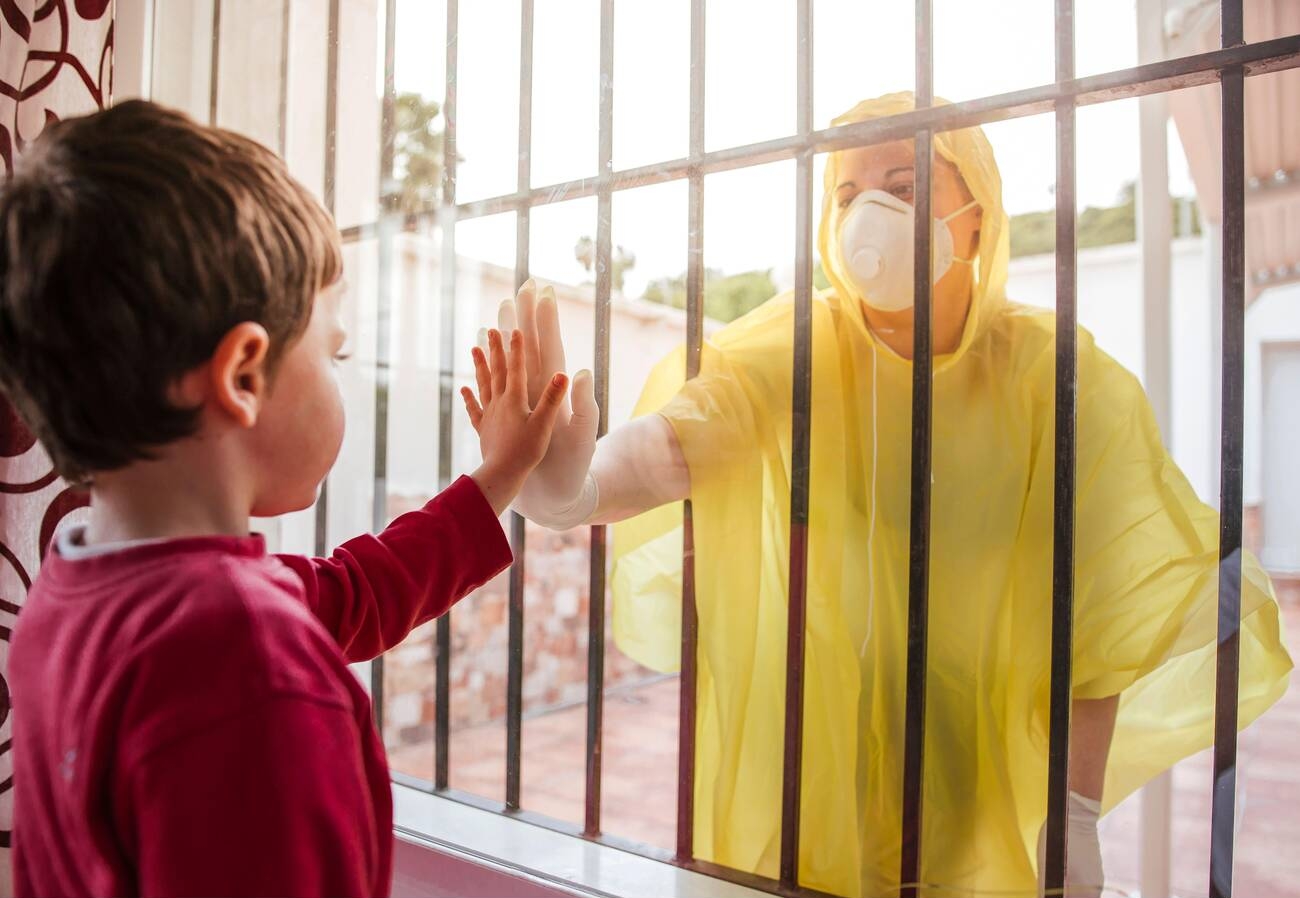As a practicing early intervention occupational therapist in a child and adult mental health clinic(CAMHS) clinic and personally as father to a toddler son born a few months before the Covid-19 pandemic and the subsequent lockdown, I have had interesting conversations with parents regarding the effects of the above on their children and if there were any associations between the pandemic(and lockdown) with the presenting difficulties their children were facing.
These discussions have ranged from parents wanting to know whether the pandemic (and subsequent lockdown) was the cause of the difficulties their children were facing or whether the severity of the difficulties would have been minimal if the pandemic did not occur. Some parents have made enquiries on whether there are ongoing effects of the Covid-19 pandemic their children might be facing or whether the effects would be long term.
On a personal level as father to a toddler son who could safely be assumed to be one of the many “Covid babies” who was born a few months before the pandemic and spent much of their infancy in home confinement due to the lockdown, I have occasionally found myself in thought whether although my son who is typical developing, would he have been more socio emotionally developed if he had spent his first year of life differently(minus the pandemic and lockdown).
Such questions are what motivated me to dig deeper into literature/research pertaining to the long-term effects of the Covid-19 pandemic and mental health consequences in children.
While measures by Governments globally to reduce the spread of Covid-19 were effective to some extent there is growing evidence of how such measures affected both adults and children’s mental health in the respective countries. It is however unfortunate that little research has been done to examine these effects on children especially because they are more vulnerable to environmental changes (than adults) and such effects could have long term effects into adulthood.
Although covid- 19 was majorly an adult disease in terms of infections, children were more vulnerable to sudden changes in their physical and social environments. These included health related behaviors, physical activity, sleep patterns, eating habits and psychological responses were negatively influenced in children. School closures and home confinement affected children’s socio emotional behavior and perceived proximity to others. Changes in the social environment affected children’s social relationships.
Research shows that The Covid-19 pandemic Influenced children’s social development differently across all ages, but the effects were larger in perceived closeness rather than social behavior.
Social relationships expand from family members to others as children grow and develop. In the initial stages parent-child relationships provide a fundamental basis for the development of social interactions with other, e.g., peers. Later these relationships with peers/friends influence children’s social and emotional development. Also, the quality of friendships leads to improvement in social behaviors.
During the pandemic children’s face to face interactions with others in social settings were limited which affected social relationships. This deprived children’s opportunities to interact with peers.
In clinical settings children’s social behavior in everyday context is assessed by Strengths and Difficulties Questionnaire (SDQ) which includes components of peer problems and prosocial behavior.
SDQ has enabled researchers to investigate the impact of Covid-19 pandemic on children’s social relationships through online surveys e.g., a UK study reported increased children’s socioemotional problems during the pandemic compared to pre-covid. This is due to the strict national lockdown in England; whereas in Japan which had less intense lockdown research showed increased prosocial behaviors in children during the same period.
Other studies have used the IOS Measure (measure to assess the level of overlap in boundaries between oneself to another) to measure children’s perceived closeness/proximity to others. It is possible to assume that school closures significantly affected the way children perceived closeness to others.
Using the IOS measures, elementary school children’s perceived proximity to parents significantly decreased during and after school closure, while to others such as peers it increased.
In infants and preschoolers social quarantine would not have affected this age group of children’s social relationships with others since parents are the dominant others during these periods of interaction. But for Elementary schoolers whose dominance of association with parents has weakened while with peers it has strengthened, research has shown that the pandemic(lockdown) significantly influenced the way children perceived closeness to others.
Studies have also shown that there were no significant changes in infants and preschoolers perceived closeness to both parents and others unlike in school age children. Social quarantine less impacted these age group of children social relationships because for younger children unless there were circumstances that significantly altered the ways of parent-child relationships (e.g., parent-child permanent separation), perceived proximity remained strong even with lockdown related home confinement.
Younger children’s perception would be that perceived proximity required the same (parent/child interactions), unless unusual circumstances where family co-existence was challenged.
In middle school where peer relationships are intimately formed, the quarantine psychologically distanced children from others, thereby this age group of children’s perceived proximity to others negatively influenced their social development and wellbeing.
Quarantine was not related to children’s social behavior for all age groups in most research because although school closure influenced children’s social relationships, it was not severe enough to change children’s behavior towards others.
Parents may have also felt strong stress under lockdown which led to negative children’s social behaviors. Parents’ mental health problems could have affected children’s mental health during the pandemic.
Other studies have also shown that Covid related variables which include home school experience, child perceived family stress and instability, screen time use, missing friends and worry about virus infection were associated with children’s emotional, physical, and cognitive and worry reactions. With family stress and instability having the strongest effect.
Older children were more negatively impacted i.e., reported higher levels of reactions with home schooling and social isolation under Covid-19.
Apart from academic learning, schools are also areas for development, socialization/connecting with friends/peers and emotional support from teachers. School closures due to Covid-19 led to academic learning loss and multiple health risk behaviors.
Studies show that social isolation during the pandemic caused loneliness, negative effects on mental health and other health related behaviors in children and adolescents e.g., elevated depression and anxiety. Also, loneliness and mental health problems in adolescents were majorly due to social media use and lack of physical contact with friends.
Family consequences of the pandemic included changes in the division of labor and daily routines in families, family disruptions affecting family routines, rituals and rules, changes in rituals including religious or cultural celebrations. These disruptions led to increased household tensions and increased interparental conflicts.
Family stress and instability are more strongly linked with emotional reactions in older children.
For older children, support from friends is more important and that meant that they were more severely affected by the changes than younger children.
Other research while focusing on children tried to shift focus from psychopathology and mental health difficulties to normal range of reactions with Fewer reported emotional reactions but more physical and cognitive reactions in children i.e., coped better emotionally but poorly in sleep and concentration.
Research also indicates that increased Screen time/social media use, but not online gaming led to loneliness and symptoms of anxiety and depression in older children and adolescents. Home schooling gave children more control over their day but required an important level of discipline and motivation to succeed. Missing friends was also linked to higher levels of emotional reactions because children need emotional support from friends and absence of usual contact at school heightened emotional reactions.
Worrying about the virus infection led to more emotional and worrying reactions. This worry was linked to a wider range of emotional reactions in children.
Some research has also demonstrated the positive attributes to the pandemic which include lockdown measures reducing many daily stressors for some children and families, children’s wellbeing might have improved under covid-19 because of increased parental attention and support than usual, and families spent more time together. Another reported positive attribute was that children got a break from school related worries and pressures.
In summary it is a fact that characteristics of quarantine differed across countries (e.g., strict lockdown or activity restrictions in the form of self-restraint rather than a lockdown) so results of one study in a particular region/country may not be generalized to children in different situations elsewhere. It is however my hope that my literature review can help provide some clarity to parents regarding the topic which most of us would rather wish to forget (covid- 19 pandemic and the impact it had /continues to have on our children).
References:
Hiromichi et al, (2022) COVID‑19 school and kindergarten closure relate to children’s social relationships: a longitudinal study in Japan; Scientific Reports 12:814
https://doi.org/10.1038/s41598-022-04944-2
Larsen et al, (2021) The impact of school closure and social isolation on children in vulnerable families during COVID‑19: a focus on children’s reactions
European Child & Adolescent Psychiatry (2022) 31:1231–1241
https://doi.org/10.1007/s00787-021-01758-x
About Author:
Elijah, an Occupational Therapist, has an impressive career span of over a decade specializing in medical rehabilitation, with a deep-rooted passion for children with special needs and their families. After earning his degree in 2009, Elijah began his professional journey at the ‘Association for the Physical Disabled of Kenya’, a charity NGO based on a model rooted in Community Outreach, Community Rehabilitation, and Static Clinics. Later, Elijah channelled his expertise into founding his private practice, the Personalized Therapy Clinic, where he served as the Lead Therapist.
Author
ELIJAH OKALL
- Occupational Therapist





